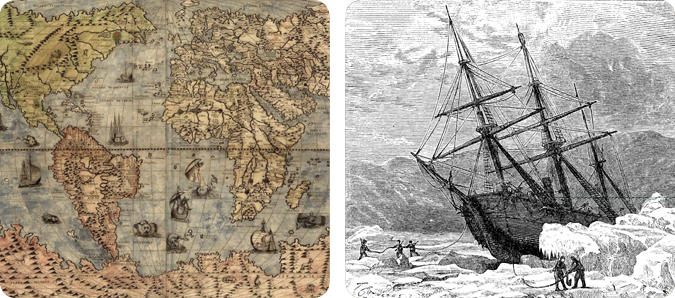
Exploration
Introduction
Human exploration extends travel beyond our basic need for movement. The impulses to discover new territory, chart new oceans and now explore outer space, have been driving forces in the creation of the modern era. The reasons behind these travel impulses are various and often overlap.
Ambition leads me not only farther than any other man has been before me, but as far as I think it possible for man to go.
Captain James Cook, Journals (1774)
Key Aspects
Human travel for exploration is motivated by a range of desires. Because of the great risks and challenges involved, these journeys have often required the backing of patrons, societies or governments.
Exploration for territory or trading routes
The great European voyages of exploration in the fifteenth and sixteenth centuries were motivated by the desire to find new trade routes to the Indies or sources of gold and silver. Later voyages to unknown lands were often motivated by the search for territory, often to establish plantations, settlements and colonies. It should be noted that the consequences of such exploration often stimulated further travel and migration.
Exploration for adventure, discovery and fame
The wish to be the first to discover a continent, to traverse to the ends of the earth such as the North and South Poles, to climb a mountain for the first time or by some new unknown route: each stems from the unique motivation that arises from the status of being the first to do something. Such explorers have been championed by modern society; represented by the fascination with James Cook, Robert Falcon Scott, or Edmund Hilary. The desire to conquer the unknown also pushes many explorers to risk all in pursuit of this end. In some cases, such as Sir John Franklin’s 1845 Arctic expedition and Scott’s trek to the South Pole, the expedition resulted in the deaths of many involved.
Exploration for knowledge and scientific advancement
Since the 18th century an increasing emphasis has been placed on scientific discovery as a motive for exploratory travel. The Voyage of the Beagle, through Patagonia and the South Pacific, is a classic example of the way in which exploratory travel revolutionized scientific enquiry; in this case the discoveries inspired Darwin’s theory of natural selection. Scott’s Antarctic expedition, although it ended in tragedy, also contributed greatly to scientific knowledge.
Exploration beyond the Earth and virtual travel
With the decreasing amount of undiscovered territory on Earth, much attention is now focused on space as a location for exploratory travel. The moon race was motivated by economic and political competition between the superpowers of the United States and the Soviet Union. Today, however, there is international collaboration in many projects, and there is much focus on the scientific benefits of investigating new worlds. Proposals include a mission to Mars, the development of space tourism and the use of unmanned exploration machines. As we move beyond the capacity of human travel, so we use robots and probes to do our exploration for us; NASA is also developing the idea of virtual space exploration, in which one can walk through a simulation of the landscape of Mars or the Moon.
So, if you cannot understand that there is something in man which responds to the challenge of this mountain and goes out to meet it, that the struggle is the struggle of life itself upward and forever upward, then you won’t see why we go.
George Leigh Mallory (1922)
Practical Implications
- Globalisation has been built on the ideals of exploration. The impulses behind discovery have led to the development of worldwide trading links, the growth of empires, forced enslavement and the decline of indigenous societies. More recently, however, the hope of scientific advancement points to increased international collaboration in exploratory space travel.
- Exploration often pushes the extremes of human travel in terms of risk and challenge.
- As the focus of exploratory travel has moved to outer space we are moving beyond the capacity of human travel, and towards an era of unmanned exploration, or even virtual travel.
If our long-term survival is at stake, we have a basic responsibility to our species to venture to other worlds.
Carl Sagan, Pale Blue Dot (1994)
Further Reading/Resources
Marco Polo, ed. R. Latham, The Travels (Penguin, 1958).
The famous medieval travelogue of a Venetian merchant’s exploration of Asia.
Charles Darwin, The Voyage of the Beagle: Charles Darwin’s Journal of Researches (Penguin, 1989).
Account of Darwin’s momentous voyage of scientific exploration to South America and beyond.
Caroline Anderson, The Endurance: Shackelton’s Legendary Antarctic Expedition (1999).
Insightful retelling of Shackleton’s dangerous expedition and the motives of those who joined him.
Carl Sagan, Pale Blue Dot: A vision of the human future in space (1994).
Illuminating explanation of the importance and difficulties of human space exploration.
Key Questions
How have voyages of exploration changed the possibilities for human travel?
What can the motivations for such extreme journeys tell us about the human travel instinct?
What implications might space exploration have for terrestrial travel?

